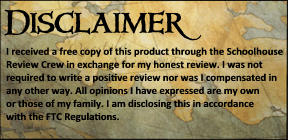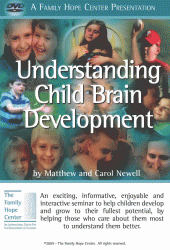
This summer I received a copy of Understanding Child Brain Development, a DVD set of a seminar by Matthew and Carol Newell of The Family Hope Center, free to me for purposes of review. This DVD set is distributed by Institute for Excellence in Writing (IEW), and not only has an Introduction by Andrew Pudewa, but also has Andrew Pudewa sitting through the seminar, interacting at various times.
Understanding Child Brain Development is a DVD seminar that everyone should watch (if you are a parent, will be a parent, are looking forward to grandchildren, work with children, etc.).
My own reasons for wanting to watch the DVDs were originally related to the fact that I am home schooling a 13-1/2 year old boy that I frequently have to struggle with over school work. Very quickly, though, I was transported through time, and my 24 year old was an infant rolling over at two weeks of age. And I was suddenly understanding why she had gone through life with learning disabilities in the areas of language skills and mathematics.
Did I already lose you? Well come back and let me explain. Because my daughter was rolling over at 2 weeks of age, she probably did not spend as much time crawling as she should have. She was always in a hurry to catch up with her sister and was an early walker as well, cutting short her time spent creeping. A section of her brain was underdeveloped because she did not spend enough time in her infancy practicing the cross-movement activities normal in crawling and creeping, and this affected her brain's ability to cross from left-brain to right-brain (or vice versa) which affected her learning abilities.
And now I am home schooling my son and dealing with issues that he struggles with. I wanted to learn about my son's brain, and I got the added benefit of learning about my adult daughter's brain as well.
Let me reign this back to my son. Although no doctor has ever diagnosed my son as autistic, the descriptions of autism in the Understanding Child Brain Development are the behaviors most like my son. Here's a YouTube video about The Family Hope Center and treatment for autism:
So, listening to the video, autism could also be key in the difficulties I experienced as my daughter developed. Between my daughter and my son, we have had to deal with all of these issues, all of which might be improved through treatments discussed in Understanding Child Brain Development:
My own reasons for wanting to watch the DVDs were originally related to the fact that I am home schooling a 13-1/2 year old boy that I frequently have to struggle with over school work. Very quickly, though, I was transported through time, and my 24 year old was an infant rolling over at two weeks of age. And I was suddenly understanding why she had gone through life with learning disabilities in the areas of language skills and mathematics.
Did I already lose you? Well come back and let me explain. Because my daughter was rolling over at 2 weeks of age, she probably did not spend as much time crawling as she should have. She was always in a hurry to catch up with her sister and was an early walker as well, cutting short her time spent creeping. A section of her brain was underdeveloped because she did not spend enough time in her infancy practicing the cross-movement activities normal in crawling and creeping, and this affected her brain's ability to cross from left-brain to right-brain (or vice versa) which affected her learning abilities.
And now I am home schooling my son and dealing with issues that he struggles with. I wanted to learn about my son's brain, and I got the added benefit of learning about my adult daughter's brain as well.
Let me reign this back to my son. Although no doctor has ever diagnosed my son as autistic, the descriptions of autism in the Understanding Child Brain Development are the behaviors most like my son. Here's a YouTube video about The Family Hope Center and treatment for autism:
So, listening to the video, autism could also be key in the difficulties I experienced as my daughter developed. Between my daughter and my son, we have had to deal with all of these issues, all of which might be improved through treatments discussed in Understanding Child Brain Development:
- hypersensitivity to sound;
- withdrawl in group settings, crawling around under chairs, desks, when classroom teachers were requesting sitting in chairs or standing;
- difficulty relationally, saying inappropriate things, unable to make friends;
- difficulty learning, or practicing acceptable social behaviors, thus pushing people away relationally;
- understanding mathematical functions one day, the next day not being able to add two numbers;
- outbursts of anger;
- unpredictable, uncontrolled temper tantrums; sadness; depression;
- medications prescribed for ADD/ADHD; going through drug after drug after after drug trying to find one that would correct the behavior without the extreme side effects;
- sleeping very little; staying awake late into the night;
- arguing; hitting;
- not willing/able to play games where a ball comes "flying at my face" as my son puts it from his own perspective.
Dietary changes are also an essential element in the treatment plans set up for the children:
- stop eating bread, anything with gluten in it;
- cutting out dairy;
- no more macaroni and cheese from a box;
- cutting out all refined, processed food, candy;
- no more brownies and cookies and bagels.
- Begin eating good foods, whole foods, steak, meatloaf, chicken, fish, organic foods, fruits, potatoes and rice.
- blindness;
- deafness;
- cerebral palsy;
- autism;
- ADD/ADHD;
- Downs Syndrome;
- and many other developmental issues.
The two-DVD set provides over three hours of instruction in five languages. It is divided into many chapters:
- Introduction, by Andrew Pudewa;
- Matthew and Carol Newell, Family Hope Center;
- Child Brain Development: Who's Really Driving?
- Why Do Brain Disfunctions Still Exist?
- Diagnosis/Treatment at The Family Hope Center;
- Physiology vs. Pathology;
- Integrated Therapy;
- Water and Its Effect on the Human Body;
- EXTRA: Stories of Hope.
In addition, the DVDs come with a Free Companion e-Book that you can download.
In watching the DVD while specifically considering my son, the type of treatment that would/will probably benefit him would probably include:
- dietary changes;
- auditory program to help organize his mid-brain;
- olfactory program to have him smell things, identify it, rotating the scents;
- possibly a program to work him through crawling and then creeping.
The main issue I need to point out here is that this DVD program does not offer the answers. It mentions the answers, but it points you (us) right to the Family Hope Center to get evaluated and develop a treatment plan. Now that's not a terrible thing, as long as you know in advance to expect it. I had approached the program hoping I would come away knowing what to do and how to do it. I am left wishing we could now go to the Family Hope Center, wishing we had known about this and done this instead of traveling to Xxxxxxx, WA in 2009, spending $X,XXX going through another expensive treatment that left some family members emotionally wounded, provided little improvement, and has left us with little more than a bad memory.
Sadly I don't think my hubby is prepared to turn around and look into a new treatment at this different treatment center, but I have offered him to watch the DVD, and one can hope. My son's difficulties, many times, look no different than the difficulties many 13-year-old boys struggle with just trying to get through adolescence. We all try to do the best we can for all our children, but often money, geography and time issues make some possible choices impossible.
For you in your situation, do I recommend the watching of this DVD? Absolutely. " Why?" you may ask. Well, for my part I am glad now that I know things I learned from the DVD. I may not have the opportunity to apply some of the information with my son, but I can be hopeful of applying some of the information with grandchildren in the next ten years. There is so much important information here that I consider it a very important piece of media for anyone in a position of working with or caring for children, like I said before. It can even be helpful to someone who only runs into kids at the grocery store or restaurants, to help them be less quick to judge the parent whose child is throwing a hissy-fit on the sidewalk or the floor, while the parent perplexedly is considering how to respond.
If any of this strikes a chord with you and leads you to want to know more, feel free to start with a search for video clips on YouTube. You will find more than the ones I have embedded above. But ultimately you should consider purchasing your copy of Understanding Child Brain Development. The cost of the DVD is $19.00. To order the DVD, please call 610-397-1737 or you can order Understanding Child Brain Development from IEW.
To get more perspectives on this 2-DVD set, click below to read reviews by other members of the TOS Review Crew:




No comments :
Post a Comment